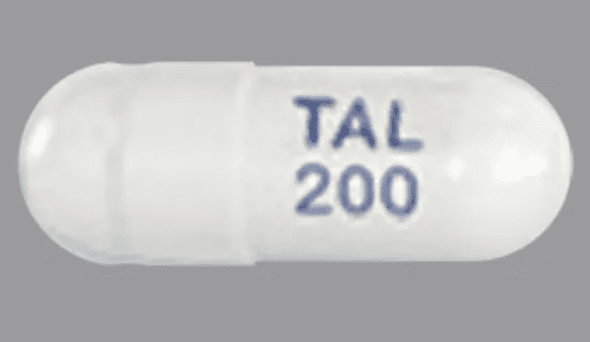Ibtrozi Dosage
Generic name: taletrectinib adipate 272mg
Dosage form: capsule
Drug class: Multikinase inhibitors
Medically reviewed by Drugs.com. Last updated on Jun 11, 2025.
Patient Selection
Select patients for the treatment of locally advanced or metastatic NSCLC with IBTROZI based on the presence of ROS1 rearrangement(s) in tumor specimens.
An FDA-approved test to detect ROS1 rearrangement(s) for selecting patients for treatment with IBTROZI is not currently available.
Recommended Testing and Evaluation Before Initiating IBTROZI
- Before initiating IBTROZI, evaluate liver function tests (including ALT, AST, and bilirubin), electrolytes, ECG, and uric acid.
Recommended Dosage and Administration
- The recommended dosage of IBTROZI is 600 mg orally once daily on an empty stomach (no food intake at least 2 hours before and 2 hours after taking IBTROZI) until disease progression or unacceptable toxicity.
- Take IBTROZI at approximately the same time each day. Swallow IBTROZI capsules whole. Do not open, chew, crush, or dissolve the capsule prior to swallowing.
- Avoid food or drink containing grapefruit during treatment with IBTROZI.
- Minimize sun exposure and use sun protection, including broad-spectrum sunscreen, during treatment with IBTROZI and for at least 5 days after discontinuation.
Missed Dose
- If a dose is missed, take the next dose at its scheduled time on the following day.
Vomiting
- If vomiting occurs at any time after taking a dose, take the next dose at its scheduled time on the following day.
Dosage Modifications for Adverse Reactions
The recommended dosage reductions for the management of adverse reactions are provided in Table 1.
| Dosage Reduction | Recommended Dosage |
| First Dose Reduction | 400 mg once daily |
| Second Dose Reduction | 200 mg once daily |
| Permanently discontinue IBTROZI capsules in patients unable to tolerate 200 mg once daily. | |
The recommended dosage modifications of IBTROZI for the management of adverse reactions are provided in Table 2.
| Adverse Reaction | Severity* | Dosage Modification |
|---|---|---|
|
Abbreviations: ALT = alanine aminotransferase; AST = aspartate aminotransferase; ULN = Upper limit of normal |
||
|
*Graded per National Cancer Institute Common Terminology Criteria for Adverse Events (NCI CTCAE), version 5.0. |
||
| Hepatotoxicity (Elevation of ALT or AST) | Grade 3 (>5 - 20 × ULN) | Withhold IBTROZI until recovery to Grade ≤1 or baseline.
|
| Grade 4 (>20 × ULN) | Withhold IBTROZI until recovery to Grade ≤1 or baseline.
|
|
| ALT or AST ≥3 × ULN with concurrent total bilirubin ≥2 × ULN (in the absence of cholestasis or hemolysis) |
|
|
| ILD/pneumonitis | Grade 1 | Withhold IBTROZI if ILD/pneumonitis occurs or is suspected until recovery to Grade 0 or baseline.
|
| Grade 2 | Withhold IBTROZI if ILD/pneumonitis occurs or is suspected until recovery to Grade 0 or baseline.
|
|
| Grade 3 or 4 |
|
|
| QTc Interval Prolongation | Grade 2 (QTc interval 481-500 msec) | Withhold IBTROZI until recovery to Grade ≤1 or baseline.
|
| Grade 3 (QTc interval ≥501 msec or QTc interval increase of >60 msec from baseline) |
Withhold IBTROZI until recovery to Grade ≤1 or baseline.
|
|
| Grade 4 (Torsade de pointes; polymorphic ventricular tachycardia; signs/symptoms of serious arrhythmia) | Permanently discontinue IBTROZI. | |
| Hyperuricemia | Grade 3 or 4 | Withhold IBTROZI until improvement of signs or symptoms.
|
| Creatine Phosphokinase Elevation | CPK elevation >5 times ULN |
|
| CPK elevation >10 times ULN or second occurrence of CPK elevation of >5 times ULN |
|
|
| Other Adverse Reactions | Grade 3 | Withhold IBTROZI until recovery to Grade ≤1 or baseline.
|
| Grade 4 | Withhold IBTROZI until recovery to Grade ≤1 or baseline. Resume IBTROZI at reduced dose or permanently discontinue as clinically indicated. Recurrence:
|
|
More about Ibtrozi (taletrectinib)
- Check interactions
- Compare alternatives
- Pricing & coupons
- Drug images
- Side effects
- During pregnancy
- FDA approval history
- Drug class: multikinase inhibitors
- En español
Patient resources
Professional resources
Related treatment guides
See also:
Further information
Always consult your healthcare provider to ensure the information displayed on this page applies to your personal circumstances.


